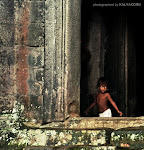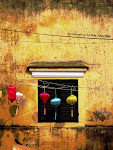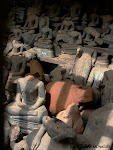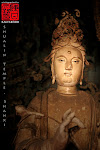By Kalyakorn Naksompop
Written on December 24, 2009
Last week, I had the opportunity to learn some interesting information about Thai curriculum in comparison to California curriculum from my classmates. As listened to the information given by my classmates, it was impossible for me not to get personally involved, simply because I spent more than half of my school life in Thai education. It's always more difficult for "outsiders" to really criticize Thai education. I, however, believe that I have every right to do so. I am Thai who was born and raised in Thailand. I went through normal Thai schools until elementary, fortunately went to international school, then back to Thai government university. Literally, I am the product from this educational system.
Being in Thai schools is never rough (unless, of course, you have your own opinions and love to share them). Just need to lay low, be ordinary, only remember what you are taught, and do what you are told. For final exams, you need not to fear because it's all multiple choices. Just know what strategy to use when you have to guess for answers. After final exams, if you feel like throwing everything you learned in classes away, it is ok because you will not need it anymore. Well, at least, not until you have to start preparing for the big Entrance Exam, which is far yet to come.
That's basically how I got through my elementary (pratom) years.
Then, I went to international school for probably the most unexpected reason: my older sister was asked not to continue in high school because her grades were not "high enough". Despite what the school said, my father knew my sister is smart and believed that it was not her fault. He decided to put his daughters in another school where they can be educated with different system and curriculum, which he thought should be more "appropriate".
My sister took half a year studying English, finally got accepted as an ESL student, and was moved to regular class after one semester. Then, she became top of the class, tutored her friends after school, and graduated with an honor roll. Now? She's about to open her second restaurant in Los Angeles. So, she's certainly not stupid. Moreover, she's doing just fine.
You see. If the same girl failed in one school but turned out to be top in another school, there must be a problem somewhere.
For my part, it was not the same roller coaster ride. But thanks to my sister, I found myself having fun and eager to learn what is taught in class for the first time. I started to raise my hands and answer questions. I also learned to state my opinions and finally learned to develop the likes and dislikes for each class. That was a big step for me. Knowing likes and dislikes means you have learned about what you want. You then develop the motivation and passion for what you "like". Through this process, you are able to look back at yourself, find who you are and what you want in life. The key is to know how to think for yourself. This is probably the most valuable knowledge I ever received from a school.
Then, I went back to Thai education by applying myself to the most famous art university in Thailand and all the memories literally came back to haunt me. In high school, my works used to be about story telling and concepts. It's my nature when creating art pieces. I didn't have the best skills or techniques when first attended university, but I knew how to create stories through my works. That, however, did not seem to be what my teachers wanted. I remembered a class called "Composition". The first week, when all my friends did something quite similar to each other: concentrating on the lines and colors, I did something totally different: making two art pieces using concept "Life and Death". Loud and clear, my teacher said, "This is not the time to explore on concepts or stories yet. I want you to focus on improving all the basic skills first. Then, you can move on to conceptual stuffs later." So, that was what I did for two entire years: practicing my techniques and forgetting all about story development. I was finally allowed to start developing my own concepts and stories in the third year. Somehow, two years of not practicing ability to think really got to me. In the first few months, I stuck. I could not think the way I used to. Even when I learned to think again, my thoughts could not flow like the way it used to. As it turned out, my techniques were improved while my creativity was killed. Worth it? I don't know..
Nonetheless, what struck me more than the fact that I was not allow to think was to see how most of my friends struggled when it came to thinking, analyzing, or creating. Many times, when students were asked to write report and present the topic to the class, many of my friends did not know even know what to do with the topic. The thing is I don't believe that my friends are stupid. Looking at what they can do when they know how to do something, they are certainly some of the most creative people I ever met. What is the problem then?
To be clear, I am not trying to say that only international schools can offer best curriculum by any means. I am just trying to point out what it is that I saw having experienced in different school systems and curricula. With the stories I told you, don't you agree that there must be something wrong?
You see. As I was taught to question, to brainstorm, and to analyze, my friends were taught to shut, to listen, and to memorize. That is a big difference. I was taught and trained to think while my friends were taught to do what teachers tell them to. But once they moved to college level, teachers suddenly asked them to think by themselves. Yes, there are special people who may be able to jump from 1 to 10, but what about the rest?
I personally believe that people are born with the ability to think and be creative, but they must practice to use this ability under the appropriate environment. To be honest, I don't believe that what most classes in Thai schools provide is the appropriate environment, judging from what I saw and had been through. I also believe that the big part of the problem is the people resources. In other words, Thai educators are not able to pull out this ability in students. Well, that's what I used to think. Listening to some of the facts my friends presented, I found that maybe the root of the problem is not at teachers anymore, but is more likely to be at the system. Yes, teachers can be a little more supportive in students' ideas and opinions. However, we must remember that it was how they were taught when they were students. What they do in class reflect their belief, their culture, and their background. They act base on what they know.
Thus, the problem is not only the people, but it must be something bigger. Perhaps, it's the entire system that makes Thai education ineffective. For example, looking at Thai National Curriculum, it does not provide enough information for teachers in doing their job. Meaning, teachers are off to do whatever they want. What are the odds when teachers are not provided with enough details, guidelines, or criteria on what they are supposed to do? Well, some great teachers may use this opportunity to bring their curriculum to the level no one has ever reached before. Other good teachers may try to find out what should be taught and how, then create the curricula that are appropriate to their students as well as the instructions. What about the rest? Well, they can do whatever they want. There is no way anyone can judge whether they are doing good or bad since there's no criteria to base on. In other words, there is no guideline for anyone, either the teachers or the schools. Meaning, there is no standard nor system to control the content being taught as well as the capability of people who teach. Due to this fact, no matter how beautiful objective of Thai curriculum seems, it will never be effective. Besides the problem mentioned above, such lack of guidelines result in huge gaps between schools throughout the country. In the end, whom has the damage been done to? Well, who else but the students that we called "future of the nation".

.jpg)

.jpg)
.jpg)


 With this being said, I personally believe that to educate is to provide the foundation for child’s personal growth as an individual in association with reality. To survive in the world that changes rapidly, one must be different and unique. He must have the ability to bring out the best of himself (individuality) and take it to the next level with creativity, but not to forget the truth of reality. Educators must help by facilitating children to develop these abilities at the cognitive level. Children must be educated with knowledge that doesn’t apply only in classrooms, but that is something they can relate to continually throughout life. Only in this case we can call education successful.
With this being said, I personally believe that to educate is to provide the foundation for child’s personal growth as an individual in association with reality. To survive in the world that changes rapidly, one must be different and unique. He must have the ability to bring out the best of himself (individuality) and take it to the next level with creativity, but not to forget the truth of reality. Educators must help by facilitating children to develop these abilities at the cognitive level. Children must be educated with knowledge that doesn’t apply only in classrooms, but that is something they can relate to continually throughout life. Only in this case we can call education successful. With this being said, I personally believe that to educate is to provide the foundation for child’s personal growth as an individual in association with reality. To survive in the world that changes rapidly, one must be different and unique. He must have the ability to bring out the best of himself (individuality) and take it to the next level with creativity, but not to forget the truth of reality. Educators must help by facilitating children to develop these abilities at the cognitive level. Children must be educated with knowledge that doesn’t apply only in classrooms, but that is something they can relate to continually throughout life. Only in this case we can call education successful.
With this being said, I personally believe that to educate is to provide the foundation for child’s personal growth as an individual in association with reality. To survive in the world that changes rapidly, one must be different and unique. He must have the ability to bring out the best of himself (individuality) and take it to the next level with creativity, but not to forget the truth of reality. Educators must help by facilitating children to develop these abilities at the cognitive level. Children must be educated with knowledge that doesn’t apply only in classrooms, but that is something they can relate to continually throughout life. Only in this case we can call education successful.